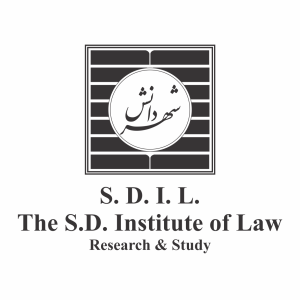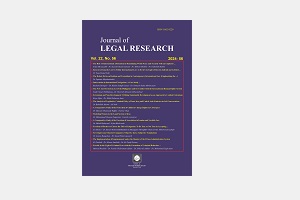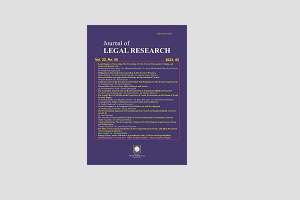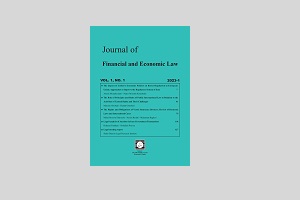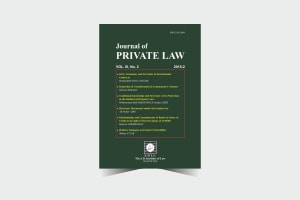Journal of
LEGAL RESEARCH
Number 24
Vol. XII ● No. 2
Autumn 2013 – Winter 2014
Managing Editor: Vahid Eshtiagh
Editor-in-Chief: Seyyed Ghasem Zamani
CONTENTS
Articles
Arbitration and the Peaceful Settlement of International Disputes
Seyed Jamal SEIFI (Ph.D.)
Legal Aspects of the Geneva Joint Plan of Action 2013
Nader SAED (Ph.D.)
Violation of the World Trade Organization’s Agreements: Challenges Ahead
Mojtaba MOROVVAT (Ph.D.)
The Attitude toward Justice and Justifice-orinted Concepts from viewpoint of Foundations of International Law Binding in Theory and Practice
Akbar ADIBI (Ph.D.)
Breaching Human Rights in Bahrain: Norms of International Human Rights
Mehrdad MOHAMMADI
Explaining the Export and Transfer of Pollution in International law
Seyed Hadi PAZHOUMAN
Responsibility of Carrier toward Good Under Hamburg and Rotterdam Rules: Comparative Study
Mehrasa MOHEBI
Articles
Arbitration and the Peaceful Settlement of International Disputes
Seyed Jamal SEIFI (Ph.D.)
Associate Professor of International Law: Shahid Beheshti University, Arbitrator of IUSCT
Abstract:
The idea of arbitration as an important tool of peaceful settlement of disputes and realization
of justice is a universal and continuous notion and is deeply rooted in the history and cultures
of most civilizations. Not surprisingly, the universality and continuity of the concept of
arbitration, in the context of maintaining international peace and with particular emphasis on
the institutional aspects of international arbitration. It is also worth pointing out that a
considerable degree of convergence among various arbitral mechanisms as to the core
elements of arbitral process such as the principle of competence-competence, observance of
due process, independence and impartiality of all arbitrators, obligations of the parties to
comply with the procedure, the binding nature of the award, and the finality of the award is
noticeable.
Keywords: Arbitration, International Disputes, Award, Hague Peace Conferences, Justice,
ICSID, Iran-United States Claims Tribunal
Legal Aspects of the Geneva Joint Plan of Action 2013
Nader SAED (Ph.D.)
Director of Academia Deparment, Islamic World Peace Forum
Abstract:
The Joint Plan of Action agreed in Geneva on November 24, 2013, between the P5+1 nations
and Iran (JPA or “Iran and 5+1 Nuclear Agreement” or “Deal”) is a politically binding
instrument but with important legal indirect implications on legal rights and duties of the
parties in international nuclear law. Whereas the inapplicability of the Security Council
Resolutions on Iran’s nuclear issue, a decade crisis directed the relevant parties to partially
restrict and implement the SC regulatory and punitive provisions, terminate (unlawful)
sanctions (multilateral and unilateral) and also resolve some misunderstandings on Iran
nuclear program. These developments opened a window to revise past safeguards problems
within the IAEA and the UN. At a practical viewpoint, this agreement is a state practice, a
concept related to international law sources in the ICJ Statute, Art. 38. This practice
substantiated the sufficient degree of participation on the part of states whose interests are
likely be most affected. This paper analyzes the JPA in light of international legal order
especially international nuclear law and UN law.
Keywords: Geneva Nuclear Agreement, Iran, 5+1, Right to Enrichment, Suspension of
Enrichment, Sanctions, NPT.
Violation of the World Trade Organization’s Agreements: Challenges Ahead
Mojtaba MOROVVAT (Ph.D.)
Attorney at Law
Abstract:
WTO law links covered agreements with Dispute Settlement Understanding rules. This matter makes the member commitments to compulsory process of negotiation, arbitration, appeal and effective enforcement that ultimately their goals are elimination of violation without costs and damage to the trade relations. With regard to all WTO achievements, rather there are some obstacles in WTO laws, so that some scholars have mentioned them as a (legitimacy crisis) .in this view there are some fundamental challenges for World Trade organization; such as, WTO universality and the problem of integrating trade liberalization, erosion in the nondiscrimination s principle, state sovereignty base of members, lacking Solidarity and Coordination with governmental organizations, lacking transparency in relation with Civil Society, Deficits in the dispute settlement system, unstable and mutable form, effects arising from official Decision making, political Considerations, some process that are Occasionally ineffective and the weak role of WTO director general. Furthermore when Agreements are violated, in particular, it has some challenges between members and WTO Organs that damages contractual relations between members. The violation has direct effect on WTO Favorable function and compensation. Therefore in this article analyzing challenges arising from violation of the WTO agreements is the main debate.
Keywords: World Trade Organization, nullification or impairment of benefits, covered
agreements, dispute settlement.
The Attitude toward Justice and Justifice-orinted Concepts from viewpoint of Foundations of International Law Binding in Theory and Practice
Akbar ADIBI (Ph.D.)
Assistant Professor of International Law: Payame Noor University
Abstract:
“Justice” has always been ancient ideal of human and will be continue in such a way that root
of many disagreement and conflicts ought to look for in none achievement kind of human or
communities to it. Human has been always seeking justice as instinct mood in everywhere and every time and in self social relationships. The efforts and structures that for this purpose are done in domestic law of different society, in so much has guaranteed justice but because of absence or defect or none efficiency of such efforts and structures in international law, perfect and absolute implementation of justice be faced with itself specific problems and has difficult way in affront. Although, we can not imply crucially that binding basis of international law in current situation is justice and achievement to it, but we cannot ignore attitude and tendency of international community toward this issue and approval of principles and regulations on this basis and yet this process is continued.
Keywords: Justice, Equity, Human Rights, Peace and Security, International Community,
Globalization.
Breaching Human Rights in Bahrain:
Norms of International Human Rights
Mehrdad MOHAMMADI
LL.M. in International Law: Allameh Tabataba’i University
Abstract:
International peace and security cannot be established unless the states respect their
international obligations thoroughly. One of these obligations is the human rights; norms
which must be respected both during peace and war times.
As in many Arab countries of the region, Bahrain experienced the torrents of democratic
movements and protests, generally known as the “Arab Spring”. In pursuit of democracy, the
people of the smallest Arab country of Persian Gulf region revolted. Though their demands
had roots in more than four decades ago, but their widespread protests against the Bahraini
regime started on 14 February 2011.
Bahrain government, in its turn, encountered the protesters harshly and suppressed the
movements. In this context the government of Bahrain, ignoring its human rights obligations,
tremendously violated citizens’ basic rights. In this article we have first enumerated the some
of the most important cases of human rights violations, and then these violations are
compared to the relevant treaty obligations of Bahrain.
Keywords: Bahrain, International Human Rights, International Community, Universal
Declaration of Human Rights, Breaching Human Rights
Explaining the Export and Transfer
of Pollution in International law
Seyed Hadi PAZHOUMAN
Assistant Professor of International Law: IAU
Abstract:
Numerous laws, international documents and treaties at different levels were created on
environment law and the various aspects of the environment were addressed. Air, soil and
water as the main elements of environment have been targeted. Environmental law has always been in constant effort and struggle to solve the pollution problem, has fought its origin, has determined its rate, and is always looking for the answer to the question of what must be done. All this is done because “the pollution is the primary goal of environmental law. Varied and diverse environmental challenges have surrounded our planet in such a way that the environment, in its general sense, is caught in it. The spread of pollution and its move from areas under the jurisdiction of a country to outside the region represents the interdependence of various components of the environment in general. And in this view, environment would not be an issue of a single nation and would not be bound to a single region, because most human activities in one state may have effects on states beyond its original state, whether bilateral, regional, meta-regional or international.” Scientific discoveries have proved important points in the field of environment. The first point is the integrity of the Earth. The Earth is unified; i.e., pollution of a part of the earth can spread over other parts, water pollution results in soil pollution. The second point is that the contamination is bordercrossing, it’s blind to borders. Birds, water and climate flows are carriers of pollution. Third and finally is the influence of kinds of pollution on each other. To these points, transfer and export of pollution, which can be one of the important and worrying issues of the international community, must be added. In other words, export and transfer of pollution adds to the complexity of the issue, namely in addition to dissemination of pollution, integration features of biosphere and the nature of pollution itself which can never be settled, and transporting and exporting pollutants together with it’s origin with human intervention will be transferred to other locations, whether deliberate or unelaborated, is an indisputable fact. Therefore, it is necessary to explain its meaning and compare it with transboundary pollution.
Keywords: pollution, export and transfer of pollution, transboundary pollutions,
transboundary pollution definition, comparison between the export and transfer of pollution
and transboundary pollution, the ways of transfer and export of pollution.
Liability of Carrier toward Goods under International Convention of Hamburg and International Convention of Rotterdam: Comparative Study
Mehrasa MOHEBI
LL.M. in International Law
Abstract:
The Purpose of this article is study and more understanding of duties forwarding agent’s
duties and responsibilities for goods damage. Since international goods transport plays
essential role in international trade, in addition to goods sellers and purchasers, forwarding
agents are considered one of principal pillars in this regard. Also, sea carriage agents
internationally have a special role in transfer of goods. Definition of their duties and
responsibilities from international aspects especially with regard to taking care of goods and
their safety has as a consequence the regulation of their activities. Hamburg Convention
discusses in details these responsibilities, but since sea carriage of goods which today is
carried out through modern ways particularly with emergence of electronic exchanges,
revision in responsibilities for coordination and care of goods is of especial importance in
relationship of forwarding agents with commodity owners. It seems Rotterdam Convention,
by study and completion of this matter (transportation) and making it transparent, is drawn up
in line with the above legal objectives.
Keywords: Liability of Carrier, International Convention of Hamburg, International Convention of Rotterdam, carriage of goods, Transportation.
